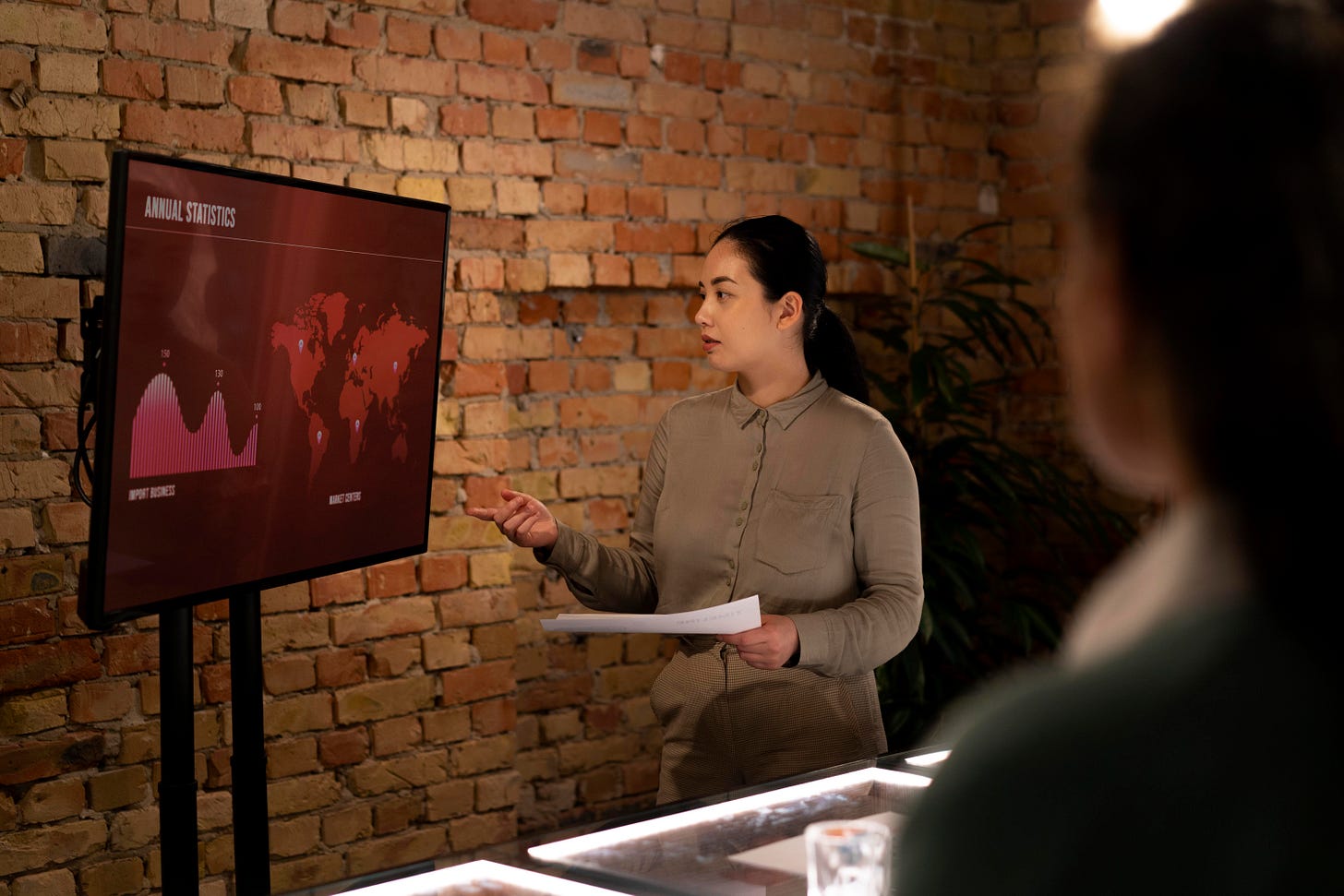The soft skills you'll need to learn before you get promoted 📈 (Part 1)
Plus, some ideas to help you grow your career
So you’ve been in your current role for over a year now, and you’re looking to get promoted. You know you’ve got the technical skills down pat. Maybe your line manager has even told you that you’re on the way to becoming a team lead.
Awesome!
But you’re probably wondering: what else should you do before requesting a promotion? How can you ✨ shine ✨ before the next performance review?
You could always ask for additional projects, or show interest in learning the stuff that’ll be useful as you climb up the corporate ladder.
Another great way to gear up is to work on your soft skills.
In this two-part article, I’ll walk you through what soft skills are, why they matter, and how you can develop them in time for the next step in your career.
What are soft skills, and why are they important?
Soft skills are the complement to “hard skills” or the technical know-how you need to get around at work. But just because they’re “soft” doesn’t mean they’re less valuable.
Soft skills are also known as emotional intelligence or people skills. These are crucial when it comes to working with colleagues, bosses, clients, and other external stakeholders. They’re integral to great interactions, successful pitches and negotiations, and career/business growth.
Your emotional intelligence also shows current or future employers that you’re a team player and a good leader. It indicates interest in personal growth, confidence, integrity, and longevity within the company.
In the Filipino job market context, soft skills are crucial. A 2024 study by the Philippine Institute for Development Studies (PIDS) showed that there is a lot of room for Filipino employees to grow in terms of soft skills, such as critical thinking, problem-solving, and adaptability. This is especially true in a work environment that continues to evolve and become more digital.
The Soft Skills Round-up (Part 1)
If you’re interested in learning what soft skills to develop and how you can harness them, here are my top 4 picks to get you started. These will help you whether you’re a copywriter like me, or you’re simply game to keep growing in your career.
(BTW, check back next week for Part 2!)
1. Attention to Detail
Remember when you first took on the role you’re in now, and your boss or client shared with you the mandatories of a particular project? For copywriters like myself, these can include tone of voice and target market.
How about the quirks you picked up along the way, like words clients don’t like to use, emojis they avoid, maybe even a turn of phrase your boss isn’t a fan of.
Here are three tips to improve your attention to detail (specific to advertising creatives, but you can adapt these to your field):
Review artworks, videos, and any script or caption 3x. Review it first for the overall impression, then for typos, then do a final check for copy-visual lock (if they complement each other and aren’t redundant). This is especially important before a material goes to print or goes live on social.
Review the brief or job order. Make sure everything is on-strat, on-brand, and answers the objectives.
Keep a running file of best practices for a brand. I like to make a checklist of reminders, comments, and watch-outs on OneNote or the Notes app. Then, before I submit anything to my team lead, I review my work vis a vis the checklist. That way, I avoid repeating mistakes and show my boss and our clients that we’re paying attention!
2. Research and Critical Thinking
Research has always been part of what I do as a copywriter, back when I was in a small agency without a strat team, and even now as I collab with brand strategists. Here are some tips I learned along the way:
Know how to use Google’s Tools! If you’re researching audience insights and trends, narrow the time relevance to 1 year, 6 months, or 1 month. Use the “News” tab to get more reliable sources such as news articles and statistics. You can also look specifically for PDFs, or narrow the results down to your location.
Use social media and forums to your advantage. Let’s say your team has no access to tools for sentiment scanning, or client has no budget for FGDs. You can use Facebook comments, Twitter/X, and even Reddit to look at what people are saying. Freemium tools like SEMRush could also help you identify the questions people are asking.
Learn how to summarize and present your findings - even internally. Your teammates and bosses won’t have the bandwidth to absorb a ton of copy-pasted text or screenshots. Instead, make a deck that consists of:
1) Summaries and takeaways of your research, and
2) Raw data you can refer to later. Don’t forget to place your sources on the same slide as the raw data! It’s a pain to have to retrace those via browser history 😉. You can learn more about synthesizing and summarizing your research via this blog post.
3. Presentation Skills
Remember that “bibo” classmate in college who always had a cool gimmick for their report? Or that professor who made an effort to make lectures and discussions engaging? They are proof that great presentation skills do make a difference.
And this isn’t just for the creative field - if you ever want to do justice to that deck you and your team worked hard on, presentation skills are key.
Some tips for developing these include:
Practice modulating your voice. Imagine that you’re a radio announcer, and you’re halfway there! Adapt your tone to suit the occasion - are you presenting something happy and upbeat, something a bit more dramatic, or do you need to be buttoned-up and formal? Your voice will set the tone for how your audience will feel.
Use pauses, pacing, and intonation. Review the presentation to see which parts will need a bit of drama and flair in terms of pauses and intonation. End sentences with a downward pitch for credibility, instead of “twirling” upwards as if you’re asking a question.
And don’t forget to pace! You want to present fast enough to keep things snappy and interesting, but not so fast that your audience can’t absorb anything.
Use body language. Whether you’re presenting online or in person, your body language can play a part in the pitch. Make eye contact with different people in the room. Stand confidently to project power and credibility. Walk around the room a bit to engage the audience, and use your hands to emphasize key points.
Read the room. One thing I learned over the years is that even within the ad agency world, people present very differently! Some creative directors prefer a more engaging and theatrical style, complete with thought-starter questions directed at clients. Other creative directors prefer more of a “stick to what’s in the deck” approach. No chit-chat. No expounding. Keep. It. Snappy.
If you’re new to a workplace, it’s best to ask to sit in on at least one presentation so you can gauge the style your employers like.
4. Adaptability
Working in an ad agency means you’ll be tackling different brands within an 8-10 hour timespan, every single day. You could be writing captions for a bank brand in the morning. Get briefed for a cosmetics brand before lunch. Then have a brainstorming sesh for an appliance brand in the afternoon!
Adaptability is crucial for adjusting to changing situations and priorities, dealing with various stakeholders, and learning new skills and systems. It spells the difference between thriving versus just coasting along.
Here are some tips for developing your adaptability:
Be curious and open to change. If something new at work comes up, like a new project or process, try to sit in on those introductory sessions, and voice out any questions or clarifications you have.
Take small, calculated, supported risks. It could be as simple as suggesting a different angle for a caption, or speaking up more during a brainstorming session. Who knows - you might even help the team become more open-minded and adaptable, too!
Request for feedback (outside evaluation season). If you and your direct line manager have the bandwidth for it, try to ask for some feedback. It could be as simple as Start-Stop-Continue - what should you start, stop, and continue doing at work? Doing this outside evaluation season works in your favor too - you get to pivot and adjust the way you do things before the critical period.
Sign up for learning opportunities. This could be as simple as learning a new skill or hobby via YouTube or SkillShare, or going to workshops and seminars your employer may offer.
What do you think of these soft skills and tips to develop them? Will you be trying them out soon? Let’s talk about it in the comments!
Don’t forget to come back for Part 2 next week! (Edit: Check Part 2 here)
See ya,
Reg
Buhay Copywriter by Regina Peralta is free today.
But if you enjoyed this post, I’d love it if you would:
- Share this post with a friend or two. It helps grow our little community, plus your friends get all the cool insights and lessons you got from this newsletter, too!
- Send a tip via my Ko-fi account or my Buy Me a Coffee account. While writing in itself motivates me, bills are a pretty good motivator, too!







